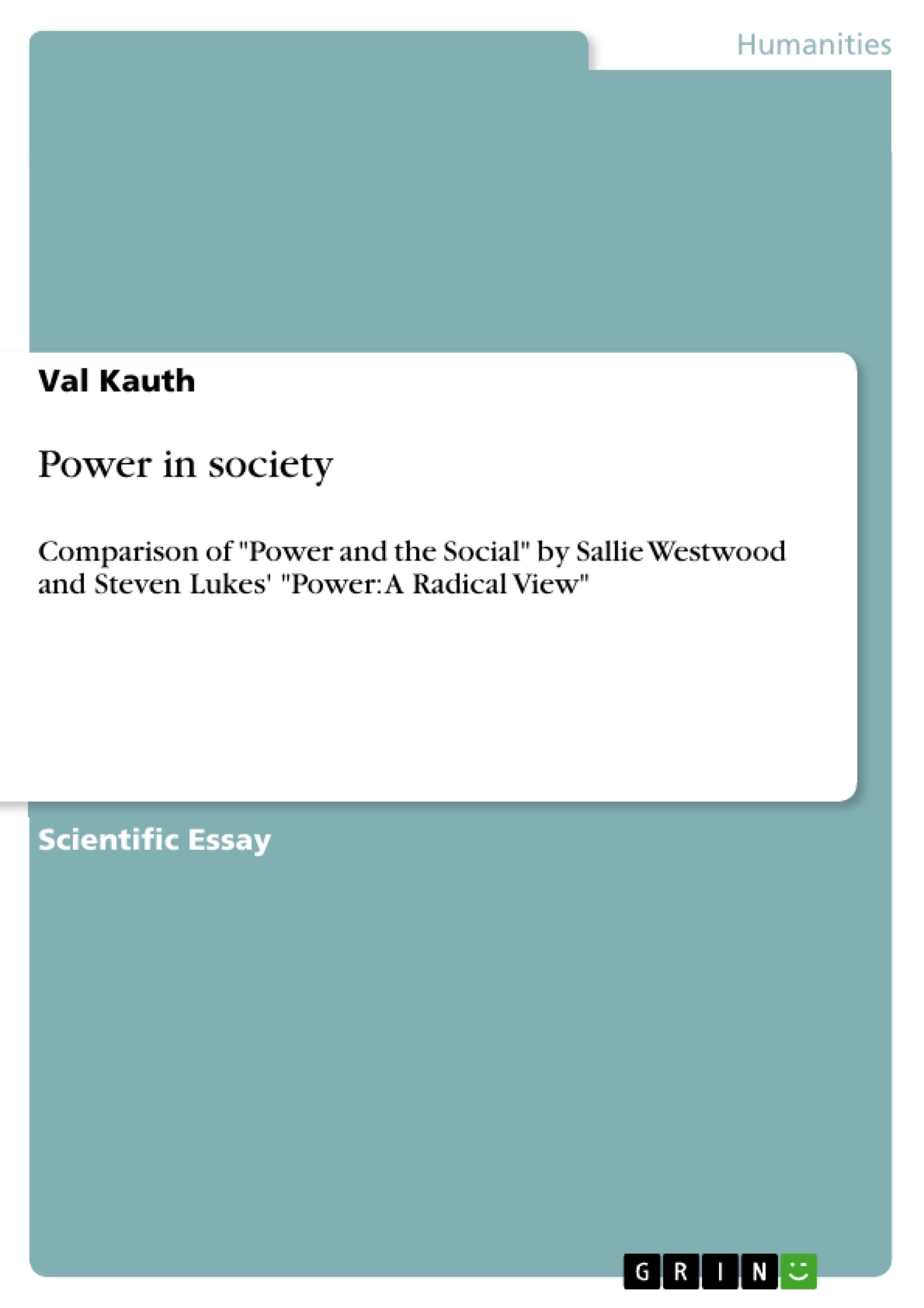Excerpt
Contents
1. Introductory remarks
2. Steven Lukes’ “Power: A Radical View”
3. Critique on Lukes account of power
4. Sallie Westwood’s “Power and the Social”
5. Critique on Sallie Westwood’s “Power and the Social”
6. Comparison and conclusion
Bibliography
1. Introductory remarks
Power has always been of a central meaning for the society as it is inherent in any social resp. political or economic relations. This concerns any kind of society, from the simple, primitive clans of hunter- gatherers, which are only segmentary differentiated to the highly differentiated societies of today´s industrial nations. Of course the importance of power relations has grown together with the amount of different social positons. According to its importance, it is a controversially discussed issue in many sciences. Psychology, Sociology, Philosophy and the economic sciences offer a large variety of different theories to explain its diverse aspects. One of the most influential concepts of power has been developed by Steven Lukes in his work “Power: A Radical View”. The following text will compare and contrast this book with Sallie Westwood´s “Power and the Social”. In the process, theoretical arguments and conclusions of both texts will initially be introduced followed by a consideration of several objections to each book.
2. Steven Lukes’ “Power: A Radical View”
In 1974, Steven Lukes published his book “Power: A radical View”. Despite its size of no more than 60 pages, it still had an enormous impact and provided material for further discussions and academic debates on the concept of power, as well as empiric research. However, his approach has been outmost controversially discussed and criticised. In a response to this, he published the second edition in 2005. There, he made concessions to criticism but also vindicated himself and still defends a revised version of his model.
However, in the following text, I will refer mainly to Lukes` 1974 essay, in which he first criticised the theoretical views of power which have been dominant in the earlier part of the twentieth century, that is to say, the one- dimensional and the two- dimensional accounts of power. In the process of his critique on the previous accounts, more importantly, he first introduced his own three- dimensional approach.
To understand Lukes` objections, the one- and two- dimensional concepts shall first be roughly explained:
- The one- dimensional view of power states that A has power over B to the extent that he can get B to do something that B would not otherwise do respectively, power involves a successful attempt by A to get B to do something he would not otherwise do. This dimension is concerned with concrete and observable behaviour. It relates to overt political conflicts. and which party can enforce decisions in their favour. This concept has become known as the pluralistic resp. the behaviouristic view of power.[1]
- The two- dimensional view was introduced by Bachrach and Baratz in their critique on the one- dimensional view. While they argue against the restrictiveness of the former view, they add a further dimension of power by noting, that “to the extent that a person or group - consciously or unconsciously - creates or reinforces barriers to the public airing of policy conflicts, that person or group has power”.[2] This form of exertion of power is defined as non-decision making. It is an instrument of status quo defenders to exclude potential challengers and promote their own dominance. Attempts to change the current allocation of power and resources can thereby be suffocated before they might enter the political space; they stay outside the scope. Accordingly, this view is not only concerned about observable overt conflict, but also about potential conflicts which are prevented from becoming actual.[3]
Lukes criticises in particular the one- dimensional view because of its behaviouristic approach resp. its concentration on overt conflicts. Although he appreciates the advantage of the two- dimensional view, which “incorporates into the analysis of power relations the question of the control over the agenda of politics and of the ways in which potential issues are kept out of the political process”,[4] he still rejects this approach and outlines that it does not deliver an entirely new argument, but merely a “qualified” critique on the restricive focus of the first view. “Qualified”, in this context refers to Lukes´ objection that this approach is still too behaviouristic. He assumes that non- decision making is a form of decision-making and criticises the two dimensional view for “its insistence that non-decision making power only exists where there are grievances which are denied entry into the political process in the form of issues. This implies that if men feel no grievances, then they have no interests that are harmed by the use of power.”[5]
The two- dimensional view still relied on the basic assumption that power could only exist in the context of actual actual, overt or covert conflicts. Lukes rejects this for (at least) two reasons:
- As Bachrach and Baratz admit themselves, manipulation and authority - which they conceive as “agreement based upon reason” do not involve actual conflict and can therefore not be approached with the second (or the first) view.
- Power is not only exerted when (as Weber enunciated it) A realises his will, despite the resistance of others resp. when A makes B do something, he does not want to do. It is also (and especially) exerted, when A directly influences distorts and shapes the will and preferences of B in his own favour.
[...]
[1] Cf. Lukes (1974), pages 11 - 15, 36 and following.
[2] Quotation: Bachrach and Baratz (1970), page 8.
[3] Cf. Lukes (1974), pages 16 – 20 and 37.
[4] Quotation: Lukes (1974), page 21.
[5] Quotation: Lukes (1974), page 24.
- Quote paper
- Val Kauth (Author), 2007, Power in society , Munich, GRIN Verlag, https://www.grin.com/document/115109
Publish now - it's free






















Comments